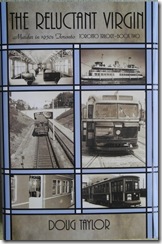The following quote is from the murder/mystery “The Reluctant Virgin.”
On Tuesday 30 March in 1954, between 2 pm and 3 pm, the famous Yonge Street streetcars ceased their designated routes on the city’s main thoroughfare. Despite the excitement caused by the opening of the new subway, there were those who lamented the demise of the old Peter Witt streetcars—“the grand old ladies of the street.” A few Torontonians grew nostalgic as they recalled the years they had huddled around the cars’ coal stoves on a winter morning, as the streetcars rumbled up the steep hill north of Bloor Street.
Some recalled that as children, when crossing the intersection at Queen and Yonge, they had viewed the busy street, peering north and south, with the bulky streetcars crowding the roadway amid the noisy vehicle traffic. When they were youngsters, they had journeyed downtown and glimpsed the marquee lights of Loew’s Downtown, the Imperial, and the Downtown theatres from the streetcar windows. Even the smaller theatres, such as the Coronet, Biltmore, and Savoy garnered attention with their colourful signs advertising films about adventurers, pirates, gangsters, and gallant soldiers.
South of Bloor Street on a wintry evening, they had gazed in fascination at Loew’s Uptown Theatre, its flashing marquee lights reflecting on the glass of the streetcar windows. The Yonge streetcar connected a world of lights, laughter, and entertainment, transporting young men and women to the city’s nightspots.
Where the streetcar line terminated at Union Station, thousands of immigrants had arrived during the previous decades and passed through its grand hall. The Yonge streetcars had provided their first impression of the vibrant, new-world city that was to be their home.
The streetcars had carried men to war when they had departed from Union Station for the battlefields of Europe. At the end of the conflict, when Toronto celebrated, the Yonge streetcars provided the backdrop for the spontaneous parties that erupted on Yonge Street.
No other streetcars ever embedded themselves into the soul of Toronto like the Yonge streetcars. They were the streetcars that delivered children to places of adventure—Eaton’s Toyland, the Yonge Arcade, movie theatres, and toyshops.
On New Year’s Eve, after attending a movie, many a young couple had welcomed in the new year on the streetcars, kissing romantically as they travelled homeward.
Throughout the years, office employees had chatted with fellow workers on the cars, sometimes arranging dates. There were those who had met their future wives on the Yonge streetcar, the men saying jokingly that the wife really “took them for a ride and picked their pockets clean.” Even in the 1950s, weddings were expensive.
The murder/mystery “The Reluctant Virgin” abounds with descriptions of Toronto during the 1950s. The restaurants, movie theatres, and sports’ venues are woven into the plot as the fictional characters, including the police detectives, move around the city in search of a serial killer that sadistically drains the blood of the victims. The descriptions of the city, along with archival photos deliver a chilling degree of realism to a fictional tale.
The book is presently available at any Chapters/Indigo store. It is also available electronically directly from the publisher through the following link: http://bookstore.iuniverse.com/Products/SKU-000188306/The-Reluctant-Virgin.aspx
To view the Home Page of the author: https://tayloronhistory.com/

